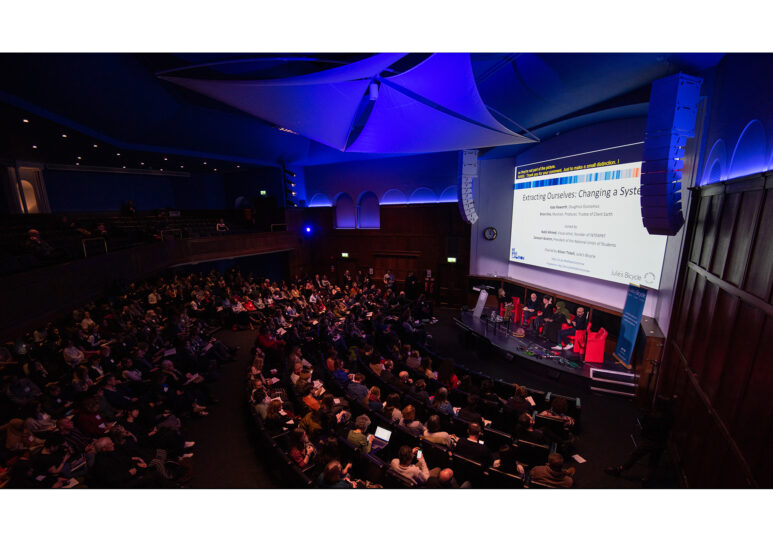- Posted on August 18th, 2020
Adapting to a Just and Green Cultural Sector

– Written by Lucy Latham, JB’s Arts Council England Programme Lead
For nearly a decade, Julie’s Bicycle has been working with Arts Council England and its National Portfolio Organisations to cut carbon impacts and co-create a sustainable creative economy. This sector-wide journey has resulted in a strong community of exemplar organisations demonstrating innovative and future-focused businesses, new skills, and values that foster sustainability and social justice. The data supports this story of positive change towards a just and green cultural sector – with one third of all National Portfolio Organisations (NPOs) now purchasing green tariff electricity and the Spotlight group reducing its carbon emissions by 41% in just six years.
Action and adaptation
Looking ahead, as the profound impacts of the Covid-19 pandemic become clearer, new challenges and priorities arise – requiring further action and adaptation. The cultural sector has been catastrophically hit by lockdown, with large parts unable to reopen until next year at the earliest. The pandemic, as well as the Black Lives Matter movement, have further exposed institutional and structural racism in workplaces and across society. Meanwhile, the UK remains off track to meet its legal targets to reduce emissions under the Climate Change Act, and still needs to submit a more ambitious action plan ahead of hosting the international COP26 climate talks next year. Our current reality is undeniably marked by hardship, uncertainty and loss as we navigate this coalescence of crises – but through the cracks, optimism, ingenuity and the ethics of care have proliferated.
We know that environmental concerns still matter to cultural organisations – even when responding to pandemic fallout takes priority – and many of you have supported our advocacy efforts for a just and green cultural recovery. It was also encouraging to see commitment to the environmental agenda reflected in the conditions of the Government’s new Culture Recovery Fund, which is being administered by the Arts Council. Building on the positive impact we have collectively made across the sector, Julie’s Bicycle has been working with the Arts Council to adapt this year’s environmental programme for NPOs, to support them on their individual sustainability journeys and work towards a more resilient cultural sector.
We are focusing this year’s environmental programme on the following ambitions:
- Decarbonisation: an immediate, rapid and urgent reduction in greenhouse gas emissions to net zero;
- Circularity: a waste-free economy that moves away from excessive consumption of finite resources;
- Justice: ensuring that no person or place is left behind in the transition.
Roadmap to a just and green cultural sector
Inspired by frameworks and bodies such as the Paris Agreement, Sustainable Development Goals (SDGs), and Committee on Climate Change – and most recently, the European Green Deal – these three intersecting ambitions will frame the journey we are taking with NPOs towards a just and green cultural sector. We are working with NPOs to develop a roadmap for what this looks like in practice, which we hope can ultimately benefit the entire cultural sector.
We will be focused on the environmental topics that really matter right now. Many cultural organisations have transitioned to offer creative work online at rapid speed in order to connect with their communities during lockdown. So our first sector briefing of 2020/21 will be on the opportunities, as well as the potential environmental impacts, of digital – empowering NPOs with the knowledge and inspiration to navigate this new territory. We will continue to advocate for the transition to net zero carbon, making use of cultural buildings currently closed to visitors to embed new energy management practices, and think creatively about the future of cultural touring. Taking the biodiversity benefits of the “Anthropause” into account (the global slowdown in human activity, notably travel, during the pandemic) – we will be developing new guides on the protection of nature and sustainable food systems. And in autumn 2020, we will be launching a new knowledge hub and collection of resources for culture, climate and social justice.
Gathering data: the environmental impact of culture
All this builds from years of collaboration with the cultural sector to discover and explore our collective response to the climate crisis. Through the Portfolio’s ongoing commitment to environmental reporting, we’ve been gathering data on the environmental impacts of culture and the arts for over a decade, using this intelligence to drive positive practical action and advocate for the sector – both nationally and internationally. The data helps us to understand our impacts, priorities, and solutions and to strengthen the community of cultural organisations and practitioners leading the way on climate action. We recognise this period of time is immensely difficult for many across the sector, but if you are an NPO able to report data this year, Julie’s Bicycle is here to help ahead of the new deadline of 30th October 2020.
Together, we have been reimagining what zero carbon culture looks like across energy, buildings, mobility, food, and materials. Now is the time to bring our cultural priorities together to speak to the broader policy agenda, and demonstrate the unique contribution of culture.
The opportunity we find ourselves in is bigger than recovery. Addressing climate change is also the opportunity to recalibrate ourselves towards prosperity and environmental justice. So stay tuned for more news on how we build a just and green cultural sector, and if you want to get involved, or you have ideas, we’d love to hear from you.
– Photo of the audience and stage at Julie’s Bicycle’s We Make Tomorrow summit, by Ben Darlington.
